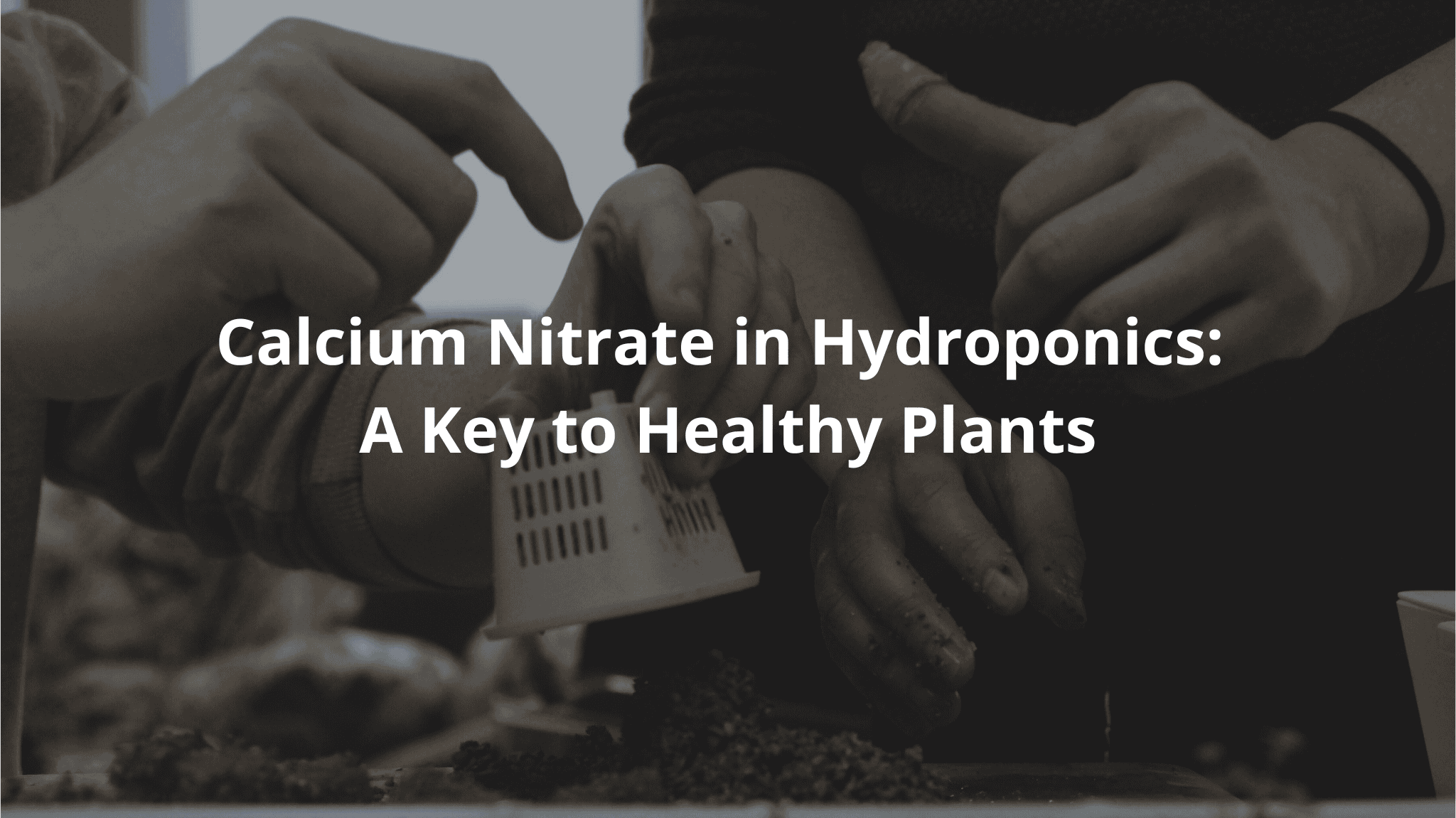Calcium nitrate is an important part of hydroponics. It helps plants grow strong and healthy. Anyone who loves plants should know about calcium nitrate, especially if they want to grow tomatoes, peppers, or other juicy veggies.
Want to learn how to use it, why it matters, and how it can help grow better plants? Keep reading for helpful information!
Key Takeaway
- Calcium nitrate is essential for plant growth, providing calcium and nitrogen.
- It helps prevent problems like blossom end rot in tomatoes.
- You can use it in different ways, like foliar sprays or through irrigation.
What is Calcium Nitrate?
Credits: Healing Hobbies
Calcium nitrate is a type of fertilizer. It has two main parts: calcium and nitrogen. Calcium helps plants build strong cell walls. Strong cell walls help plants stay healthy and fight off bugs and diseases. Nitrogen helps plants grow their leaves and stems. This is why calcium nitrate is important for people who grow plants in hydroponics system.(1)
Why is Calcium Important?

Calcium helps plants in many ways:
- It makes cell walls strong.
- It helps prevent problems like blossom end rot.
- It supports healthy growth of fruits and vegetables.
Strong cell walls are very important for fruits and vegetables. When cell walls are strong, plants can avoid problems like blossom end rot. This issue can happen when there isn’t enough calcium.
For example, when someone grows tomatoes for the first time, they might not know about calcium. They could end up with tomatoes that have strange spots. Those spots are a sign of blossom end rot.
Using calcium nitrate can help keep tomatoes and other plants healthy. By adding calcium nitrate to the soil, gardeners can make sure their plants get the calcium they need. This helps avoid problems and keeps the plants happy.
Calcium nitrate is a good way to make sure plants get the nutrients they need. It helps them grow strong and healthy. For anyone growing plants, especially in hydroponic systems, using calcium nitrate can make a big difference. It’s a simple step for a successful garden!
How to Use Calcium Nitrate
Using calcium nitrate is easy. First, dissolve it in water to make a nutrient solution. This solution can be given to plants in different ways. Here are some common methods:
- Drip irrigation: Water drips slowly onto the plants.
- Foliar sprays: The nutrient solution is sprayed directly onto the leaves.
- Sprinklers: This method sprays water over the plants like rain.
Each method has its own benefits. For example, foliar sprays are great because the leaves can absorb nutrients quickly.
Dosage Recommendations
Getting the right amount of calcium nitrate is important. A good rule is to mix about 1 gram per liter of water. If growing leafy greens, use less—around 0.5 grams per liter. This way, plants get just what they need without too much.
The Benefits of Calcium Nitrate
Calcium nitrate is like a superhero for plants. Here are some benefits:
- Preventing Calcium Deficiencies: Regular use helps plants get enough calcium and stops problems like blossom end rot.
- Boosting Growth: The nitrogen helps plants grow more leaves and flowers, making them fuller and healthier.
- Disease Prevention: Calcium nitrate helps keep plants healthy by stopping certain diseases. This means better yields and happier plants!
- Compatibility with Other Nutrients: Calcium nitrate works well with other fertilizers. For example, mixing it with potassium nitrate gives plants even more nutrients.
Using calcium nitrate correctly can make a big difference for plant health and growth. With the right methods and doses, plants can thrive and produce well.
Why pH Levels Matter
In hydroponics, pH levels are very important. The pH level shows how acidic or basic the water is. Plants like their water to be in a specific range. Calcium nitrate helps keep pH levels stable. This is great because when the pH is just right, plants can absorb nutrients properly. If the pH is too low or too high, plants struggle to get what they need. Using calcium nitrate can help keep everything balanced!
The Importance of Electrical Conductivity
Electrical conductivity, or EC, measures how well the nutrient solution conducts electricity. This is important because it shows how many nutrients are in the water. Calcium nitrate boosts the EC levels, helping ensure plants get enough nutrients.
Here’s why keeping an eye on EC levels is essential:
- Nutrient Levels: EC levels show how many nutrients are in the solution. Higher EC means more nutrients.
- Feeding Schedule: By checking EC, gardeners can know when to add more calcium nitrate or other fertilizers.
- Plant Health: Keeping the right EC levels helps plants grow strong and healthy.
pH levels and electrical conductivity are key parts of successful hydroponics. By using calcium nitrate, growers can help maintain these levels. This means plants will absorb nutrients better, leading to healthier growth. Keeping track of both pH and EC ensures plants get the best care possible.(2)
Customer Reviews of Calcium Nitrate
Many customer reviews about calcium nitrate praise its effectiveness. Most people say it really helps their plants grow better. They love how easy it is to use and how quickly their plants respond.
Some even share their success stories of growing the biggest tomatoes ever. This positive feedback encourages many to try it for themselves!
Other Nutrients to Consider
While calcium nitrate is important, it’s not the only nutrient plants need. Here are some other nutrients to use alongside calcium nitrate:
- Epsom salt (magnesium sulfate): This helps with magnesium, which is important for making chlorophyll. Chlorophyll helps plants make food from sunlight.
- Potassium nitrate: This provides potassium, which supports overall plant health. Potassium helps plants withstand drought and disease.
- Calcium ammonium nitrate: This gives both calcium and nitrogen, just like calcium nitrate. It’s another good option for feeding plants.
Using a mix of these nutrients can help create a custom hydro nutrient solution that’s just right for plants. Each nutrient plays a role in plant growth and health. By combining them, gardeners can ensure their plants get everything they need to thrive.
Calcium nitrate is a key player in plant nutrition, but it works best with other nutrients. By using a balanced approach, anyone can help their plants grow strong and produce well.
Conclusion
Calcium nitrate is a key part of growing plants in hydroponics. It provides calcium and nitrogen, which are important for plant growth. Using it correctly can prevent problems like blossom end rot and help keep plants healthy.
It’s also important to check pH levels and electrical conductivity to ensure plants are getting what they need. If someone hasn’t tried calcium nitrate yet, they should consider giving it a shot! Happy growing up!
FAQ
What is calcium nitrate and how does it support plant growth in hydroponic systems?
Calcium nitrate is a water-soluble fertilizer that gives plants important calcium and nitrogen. These nutrients help plants grow strong and healthy. Calcium strengthens cell walls, which can prevent problems like blossom end rot. When used in hydroponic systems, calcium nitrate works well with other nutrients like potassium nitrate and magnesium sulfate to create a balanced nutrient solution.
How does calcium nitrate help prevent calcium deficiencies in plants?
Calcium nitrate is great for preventing calcium deficiencies because it provides a direct source of calcium. This is important for keeping cell walls healthy and strong. When you mix it into your irrigation water, it ensures that plants get enough calcium, reducing the risk of issues like blossom end rot and improving the quality of your crops.
Can I use Epsom salt with calcium nitrate in my hydroponic system?
Yes, you can use Epsom salt, which contains magnesium sulfate, along with calcium nitrate in your hydroponic system. This combination provides both calcium and magnesium, which are essential for strong plant growth. Mixing these nutrients can enhance your nutrient solution and support the overall health of your plants.
How do I adjust pH levels when using calcium nitrate in my nutrient solution?
To keep your nutrient solution healthy, it’s important to monitor pH levels when using calcium nitrate. This fertilizer can change the pH, so you may need to adjust it using pH up or down solutions to keep it within the right range for plant growth. Regular testing helps ensure that your hydroponic system stays balanced for the best nutrient uptake.
What are the advantages of using fully water-soluble fertilizers like calcium nitrate?
Fully water-soluble fertilizers, like calcium nitrate, dissolve easily in water, making them perfect for hydroponic systems. They provide quick access to nutrients, ensuring that plants get what they need for healthy growth right away. Plus, they help maintain proper electrical conductivity in your nutrient solution, which is important for effective nutrient absorption.
How do I choose the right hydroponic fertilizer for my greenhouse grade crops?
When picking a hydroponic fertilizer for greenhouse crops, look for options like calcium nitrate fertilizers or haifa cal prime. It’s a good idea to choose ammonium-free products to avoid potential toxicity issues. Checking customer reviews can also help you find effective products that meet your needs while providing the right nutrients for healthy plant growth.
What is the difference between calcium ammonium nitrate and calcium nitrate?
Calcium ammonium nitrate contains both calcium and ammonium nitrogen, while calcium nitrate only has nitrate nitrogen. Calcium ammonium nitrate can be useful if you want a slower release of nitrogen. However, if you need quick nutrient uptake in hydroponic systems, calcium nitrate is often better because it dissolves fully in water.
How can I manage nitrate levels in my hydroponic nutrient solutions?
To manage nitrate levels in your nutrient solutions, regularly test and adjust your mixes using products like calcium nitrate and potassium phosphate. Monitoring electrical conductivity will help you understand how concentrated your nutrients are. If levels are too high or too low, adjust your nutrient ratios to keep everything balanced for optimal plant growth.
What role does magnesium sulfate play when combined with calcium nitrate?
Magnesium sulfate (Epsom salt) is important when mixed with calcium nitrate because it adds essential magnesium along with calcium. This mixture supports healthy cell wall development and overall plant strength. Using both together ensures that plants have all the necessary nutrients to grow well and prevents deficiencies.
Why is it important to consider customer reviews when selecting hydroponic nutrients?
Looking at customer reviews is very helpful when choosing hydroponic nutrients because they share real experiences with specific products. Reviews can show how effective a product is and any issues others have faced with items like calcium nitrate fertilizers or yaraliva calcinit. This information helps you make smart choices that lead to successful plant growth in your hydroponic system.
References
Related Articles
- https://tophydroponicgarden.com/can-i-make-my-own-hydroponic-nutrient-solution-2/
- https://tophydroponicgarden.com/how-to-make-nutrient-solution-for-hydroponics/
- https://tophydroponicgarden.com/hydroponics-introduction/


